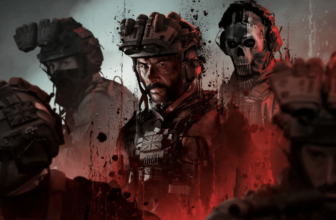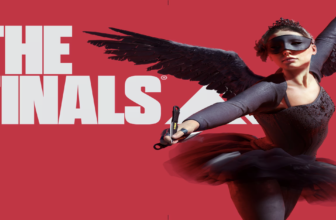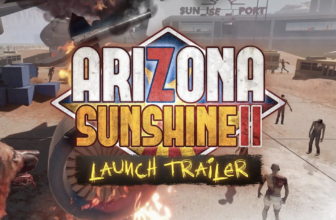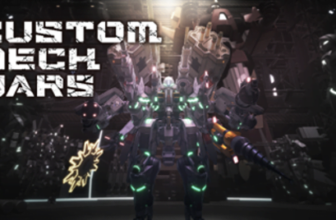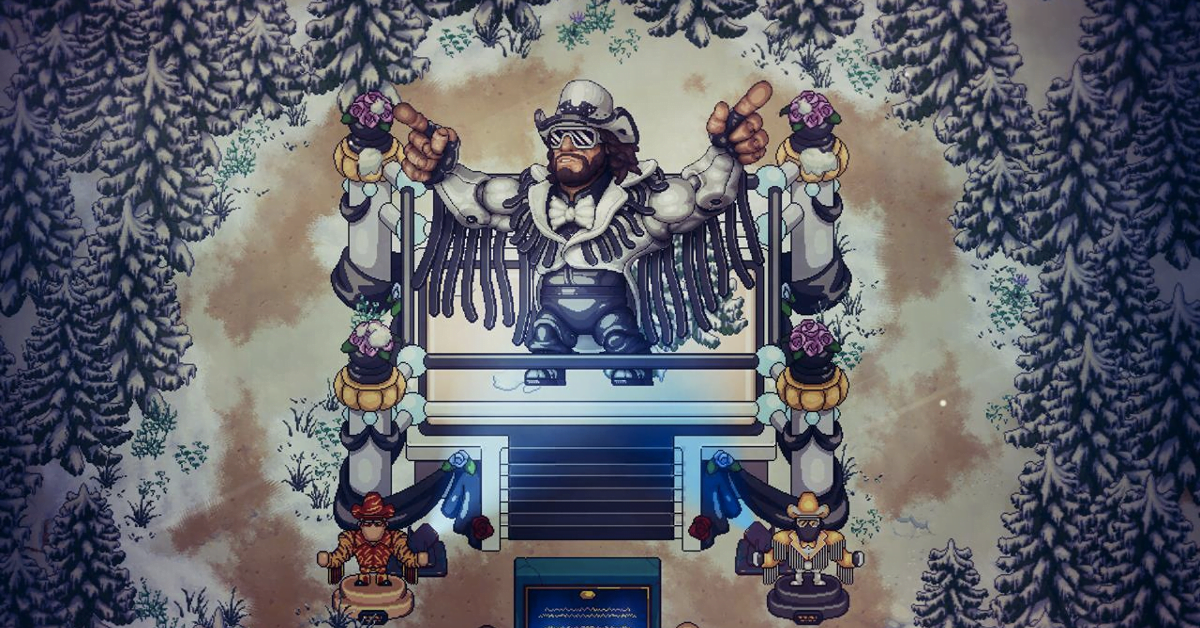
John Oliver, a comedian and HBO host, once indirectly compared wrestling to other enjoyable activities, putting it in high regard. This sentiment might not hold true for wrestling games in general, but there was hope for WrestleQuest, a new role-playing game (RPG) by Mega Cat Studios. This game promised to make Oliver’s statement ring true but stumbled due to numerous problems. Both the gameplay mechanics and presentation were plagued by various issues, diminishing what could have been a promising title for wrestling enthusiasts.
WrestleQuest invites players into an adventure narrated by podcast hosts, recounting a thrilling story of athletes rising from obscurity to stardom. Players are introduced to characters like Muchacho Man Randy Santos, an homage to Macho Man Randy Savage. Alongside his friends, Randy dreams big and seeks to prove himself in the wrestling arena.
The adventure continues as players encounter Brink Logan and his siblings from the frosty north. Brink’s resemblance to Bret “The Hitman” Hart becomes clear when he mentions being the “excellence of execution.” His attire and moves are also reflective of the famous wrestler.
The game’s excitement heightens as players join forces with a diverse cast of characters, including a humanoid stag, a mechanic resembling a toy box, a soldier mimicking a G.I. Joe figure, and a flying fish known as the “Loachador.” References to other figures in popular culture are sprinkled throughout, including a character reminiscent of Hulk Hogan.
WrestleQuest presents a fantastical world where athletes coexist with animal-like beings, action figures, and Transformers-like robots. Bright and lively visuals contribute to the nostalgic charm of the game, recalling the aesthetics of classic RPGs like Chrono Trigger and Final Fantasy VI. Turn-based battles pit players against unique opponents, ranging from toys and animal creatures to weird inventions.
Within the game, wrestling legends are not merely admired; they are venerated through grand statues narrating their feats. Famous figures such as Macho Man Randy Savage, Andre the Giant, and others might even join as managers or become summons. These elements appealed to many, including those craving classic-themed wrestling games and those seeking the over-the-top spectacle that wrestling represents.
However, WrestleQuest’s charm quickly fades due to a shallow and monotonous combat system centered around quick-time events (QTEs). Rather than enhancing the gaming experience, the excessive reliance on QTEs hampers engagement. Even basic attacks require precisely timed button presses, leading to an exhausting and repetitive experience. This is particularly evident in the pin system, which demands perfect timing and may heal a downed opponent if executed poorly.
Although there are additional combat options, such as dealing maximum damage or slowing down QTEs, these choices tend to either trivialize the game or fail to address the underlying tedium. The game’s combat also features a hype system and various team maneuvers, but these aspects are overshadowed by the cumbersome QTE mechanics.
WrestleQuest’s narrative pacing is another weak point, with abrupt transitions between teams and locations. Rather than providing a cohesive and immersive experience, the game’s disjointed structure confuses players. Ideas and mechanics are introduced and then abruptly abandoned, leading to a chaotic and incoherent journey.
While some games have successfully employed rapid shifts between environments as part of a narrative or gameplay concept, WrestleQuest’s changes feel arbitrary and disorganized. The constant movement from one setting to another, such as from a sci-fi location to a desert, feels disjointed and lacks a unifying thread like the time-traveling theme in Chrono Trigger.
During the review of WrestleQuest, I also encountered technical glitches that affected gameplay. These bugs, although potentially isolated to my experience, were significant enough to warrant mention. One particular issue forced me to reload a save from hours earlier, requiring the repetition of several game sections.
WrestleQuest offered the potential for a memorable wrestling RPG with its eccentric characters, lively ambiance, and numerous allusions to wrestling culture. Regrettably, its over-dependence on an unimaginative combat system, haphazard storytelling, and underlying technical difficulties turn what could have been an extraordinary experience into a disappointing one. Far from achieving perfection, WrestleQuest emerges as a missed opportunity, lacking the polish and innovation needed to truly shine.
Continuing the evaluation of WrestleQuest, let’s delve into some more specific aspects of the game that contribute to its overall experience, both positively and negatively.
The Game World
WrestleQuest’s world design is vibrant and creative, offering a nostalgic look back to the golden age of wrestling. The game uses bright, retro-styled visuals that evoke memories of 16-bit RPG classics. However, this stylistic choice also leads to limitations, particularly in the characterization and environmental detail. While visually appealing, the graphics sometimes lack the depth and intricacy that modern gamers might expect.
Character Development
The characters in WrestleQuest are a unique blend of human wrestlers and fantastical beings. These include references to real-world wrestlers and creative interpretations like a humanoid stag or a high-flying fish. However, the character development is often shallow, and the lack of backstory or meaningful interaction between characters results in missed opportunities for more profound engagement.
Combat Mechanics
As previously mentioned, the over-reliance on QTEs severely hampers the combat experience. While QTEs can be exciting when used sparingly, WrestleQuest’s constant utilization of this mechanic makes combat feel tedious. The attempt to simplify combat through these timed button presses ironically complicates the experience by demanding constant attention and perfect timing.
The game offers some interesting ideas in combat, such as the hype system, tag team maneuvers, and the use of managers. However, these concepts take a backseat to the repetitive QTE-driven basic attacks and skills. The novelty wears off quickly, and the lack of depth and variety becomes evident.
Storytelling and Pacing
WrestleQuest’s narrative is an ambitious attempt to weave together various threads from different wrestling worlds. The story jumps from one team to another, introducing new mechanics and environments, often without clear connections. While this could have led to an exciting, multifaceted experience, the execution is flawed.
The transitions between different perspectives feel jarring, and plot points are introduced and abandoned without resolution. The storytelling lacks cohesion, and the pacing often feels hurried, not allowing players to immerse themselves fully in the unfolding narrative.
Technical Issues
While some of the technical issues may be fixed in post-launch patches, they were significant enough during the review process to disrupt gameplay. Bugs that impede progress or force players to reload earlier saves can be immensely frustrating, especially in an RPG where continuity and immersion are crucial.
Opportunities and Potential
Despite its flaws, WrestleQuest shows flashes of potential. Its quirky characters, nostalgic visuals, and unique blend of wrestling and RPG elements make it an intriguing concept. With more attention to detail, better balance in combat mechanics, and a more cohesive narrative, WrestleQuest could have been a standout title in the wrestling game genre.
The game also offers a unique platform to celebrate wrestling culture, paying homage to legendary figures and introducing players to the world of professional wrestling. The in-game reverence for wrestling legends and the incorporation of wrestling moves and terminology provide a fascinating exploration of this entertainment form.
Conclusion
WrestleQuest is a game that tantalizes with its promise but ultimately disappoints with its execution. The engaging concept and nostalgic visual appeal are overshadowed by flawed combat mechanics, disjointed storytelling, and occasional technical issues.
The characters, though intriguing at first glance, lack depth and development, and the world, while visually charming, misses opportunities for deeper exploration and interaction.
The repetitive and cumbersome QTE-driven combat system turns what could have been an engaging and dynamic experience into a monotonous chore. The storytelling, ambitious in its scope, fails to deliver a cohesive and immersive narrative, further diminishing the overall experience.
While WrestleQuest might attract fans of wrestling or retro RPGs, its shortcomings are likely to leave many players feeling unfulfilled. The potential for a memorable and innovative wrestling RPG is evident, but the game falls short in crucial areas. Far from a championship title, WrestleQuest finds itself grappling with its limitations, struggling to rise above mediocrity. Its legacy may end up being a cautionary tale of unmet potential rather than a triumphant celebration of wrestling culture.


